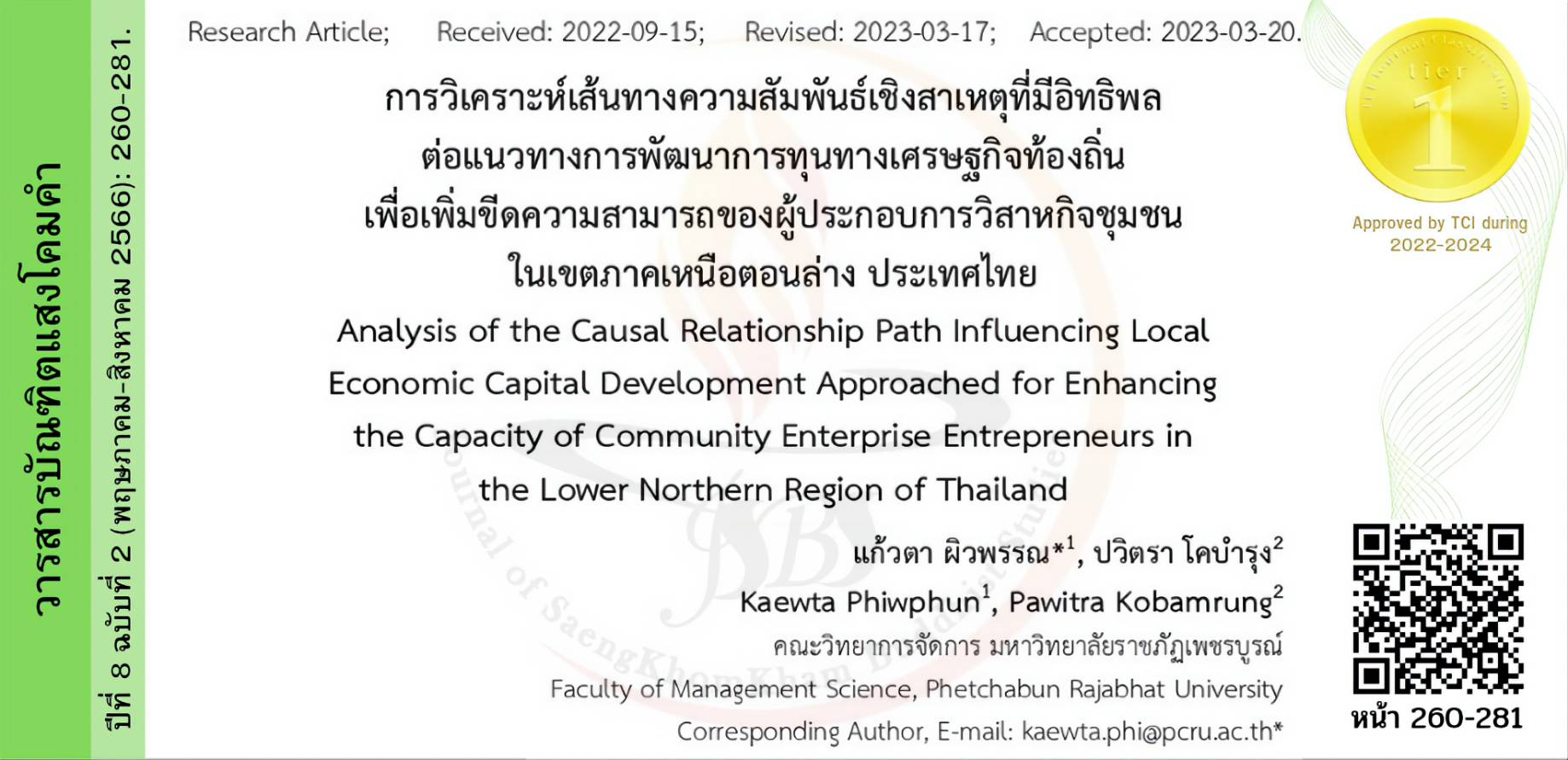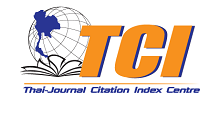การวิเคราะห์เส้นทางความสัมพันธ์เชิงสาเหตุที่มีอิทธิพลต่อแนวทางการพัฒนาการทุนทางเศรษฐกิจท้องถิ่น เพื่อเพิ่มขีดความสามารถของผู้ประกอบการวิสาหกิจชุมชนในเขตภาคเหนือตอนล่าง ประเทศไทย
คำสำคัญ:
ความสัมพันธ์เชิงสาเหตุ, ทุนทางเศรษฐกิจท้องถิ่น, ผู้ประกอบการ, วิสาหกิจชุมชนบทคัดย่อ
การวิจัยครั้งนี้มีวัตถุประสงค์ 1) เพื่อศึกษากลยุทธ์ส่วนประสมทางการตลาดด้านทุนทางสังคม ทุนทางเศรษฐกิจท้องถิ่นของวิสาหกิจชุมชน เพิ่มขีดความสามารถในการแข่งขันของผู้ประกอบการวิสาหกิจชุมชน และ 2) เพื่อวิเคราะห์เส้นทางความสัมพันธ์เชิงสาเหตุที่มีอิทธิพลต่อแนวทางการพัฒนาการทุนทางเศรษฐกิจท้องถิ่นเพื่อเพิ่มขีดความสามารถของผู้ประกอบการวิสาหกิจชุมชน เป็นการวิจัยเชิงปริมาณ ประชากรในการวิจัยครั้งนี้ คือ ผู้ประกอบการวิสาหกิจชุมชนในเขตภาคเหนือตอนล่าง จำนวน 250 คน โดยใช้เครื่องมือวิจัย คือ แบบสอบถาม การวิเคราะห์ข้อมูลใช้สถิติ คือ การวิเคราะห์โมเดลสมการโครงสร้าง ร้อยละ ค่าเฉลี่ย ส่วนเบี่ยงเบนมาตรฐาน
ผลการศึกษา พบว่า 1) ระดับกลยุทธ์ส่วนประสมทางการตลาดด้านทุนทางสังคมและด้านทุนทางเศรษฐกิจท้องถิ่นของวิสาหกิจชุมชนมีค่าเฉลี่ยอยู่ระดับมาก ส่วนระดับเพิ่มขีดความสามารถในการแข่งขันมีค่าเฉลี่ยอยู่ระดับปานกลาง 2) แบบจำลองมีความสอดคล้องกับข้อมูลเชิงประจักษ์ค่อนข้างดี พิจารณาจากค่า CMIN-p=161.389; CMIN/df=1.416; GFI=0.956; RMSEA=0.026 พบว่า ทุนทางเศรษฐกิจท้องถิ่นของวิสาหกิจชุมชน ประกอบด้วยด้านทุนทางกายภาพ ด้านทุนสินทรัพย์ทางการเงิน ด้านทุนภูมิปัญญาวัฒนธรรม และด้านทุนทรัพยากรมนุษย์เชิงสาเหตุที่มีอิทธิพลทางตรงต่อการเพิ่มขีดความสามารถในการแข่งขันที่ประกอบด้วยด้านต้นทุนที่ต่ำ ด้านการสร้างความแตกต่าง ด้านนวัตกรรม ด้านตลาดและด้านคุณภาพ องค์ความรู้จากการวิจัย คือ แนวทางการพัฒนาทุนทางเศรษฐกิจท้องถิ่นเพื่อเพิ่มขีดความสามารถของผู้ประกอบการวิสาหกิจชุมชน จากด้านกลยุทธ์ส่วนประสมทางการตลาดกับด้านทุนทางสังคม มีความสัมพันธ์เชิงสาเหตุกับทุนทางเศรษฐกิจท้องถิ่นของวิสาหกิจชุมชน และมีอิทธิพลทางอ้อมต่อการเพิ่มขีดความสามารถในการแข่งขันที่ส่งผ่านทุนทางเศรษฐกิจท้องถิ่นของวิสาหกิจชุมชน
Downloads
เอกสารอ้างอิง
กริช แรงสูงเนิน. (2554). การวิเคราะห์ปัจจัยด้วย SPSS และ AMOS เพื่อการวิจัย. กรุงเทพมหานคร: ซีเอ็ดยูเคชั่น.
กัลยา วานิชย์บัญชา. (2562). การวิเคราะห์สมการโครงสร้าง (SEM) ด้วย AMOS, พิมพ์ครั้งที่ 3. กรุงเทพมหานคร: ห้างหุ้นส่วนจำกัดสามลดา.
คะนอง พิลุน. (2562). การจัดการทรัพยากรธรรมชาติและสิ่งแวดล้อมในท้องถิ่น. มหาสารคาม: วิทยาลัยการเมืองการปกครอง มหาวิทยาลัยมหาสารคาม.
ชูเกียรติ พงศ์พนาพิพัฒน์. (2563). กลยุทธ์ส่วนประสมการตลาดในการดำเนินธุรกิจของกลุ่มวิสาหกิจชุมชน ศูนย์ข้าวชุมชนบ้านอุ่มแสง (เกษตรทิพย์). วารสารการบริหารการปกครองและนวัตกรรมท้องถิ่น. 4 (3), 1-14.
ฐากูร อนุสรณ์พาณิชกุล. (2563). รูปแบบภาวะผู้นำการเปลี่ยนแปลงและการจัดการนวัตกรรมที่มีผลต่อความสำเร็จวิสาหกิจชุมชนในเขตภาคเหนือตอนล่าง. วารสารมหาวิทยาลัยราชภัฏลำปาง. 9 (2), 14-25.
ฑิตฐิตา แซ่ตัง. (2560). ทำความรู้จักวิสาหกิจชุมชน (Community Enterprise). กรุงเทพมหานคร: สำนักงานเศรษฐกิจการคลัง กระทรวงการคลัง.
ดนชนก เบื่อน้อย. (2559). นวัตกรรมกับความคิดสร้างสรรค์. วารสารวิชาการการตลาดและการจัดการ. 3 (1), 1-12.
ทักษญา สง่าโยธิน. (2565). การพัฒนาศักยภาพวิสาหกิจชุมชนกลุ่มจังหวัดภาคใต้ชายแดนเพื่อยกระดับความสามารถในการแข่งขัน. วารสารวิชาการ RMUTT Global Business and Economics Review. 17 (1), 96-108.
นงนุช ศรีสุข. (2563). ทุนทางสังคมที่ส่งผลต่อการเสริมสร้างความเข้มแข็งของวิสาหกิจชุมชนศูนย์ข้าวบ้านจิก อำเภอวัฒนานคร จังหวัดสระแก้ว. วารสารสหวิทยาการ. 17 (2), 78-101.
วนิดา สุวรรณนิพนธ์. (2564). ความสามารถในการแข่งขันบนฐานเศรษฐกิจดิจิทัลของวิสาหกิจชุมชน กลุ่มสินค้าท้องถิ่นในกรุงเทพมหานคร. วารสารวิจัยและพัฒนา มหาวิทยาลัยราชภัฏสวนสุนันทา. 13 (1), 1-21.
วรรณวิษา สัจจธรรม. (2560). ปัจจัยส่งเสริมศักยภาพการเป็นแหล่งท่องเที่ยวอย่างยั่งยืน ตลาดน้ำบางน้ำผึ้ง ตำบลบางน้ำผึ้ง อำเภอพระประแดง จังหวัดสมุทรปราการ. วารสารวิทยาลัยดุสิตธานี. 11 (1), 275-289.
วันชัย ธรรมสัจการ. (2565). ทุนชุมชนและศักยภาพในการจัดการตนเองเพื่อการพัฒนาที่ยั่งยืนของชุมชนท้องถิ่น. วารสารนาคบุตรปริทรรศน์ มหาวิทยาลัยราชภัฏนครศรีธรรมราช. 14 (1), 22-32.
วิชิต อู่อ้น. (2550). การวิเคราะห์ข้อมูลในการวิจัยเชิงคุณภาพ, พิมพ์ครั้งที่ 9. กรุงเทพมหานคร: จุฬาลงกรณ์มหาวิทยาลัย.
ศุภวัฒน์ ปภัสสรากาญจน์. (2558). เอกสารประกอบการสอน รายวิชาการพัฒนาเศรษฐกิจชุมชนตามแนวเศรษฐกิจพอเพียง. กรุงเทพมหานคร: มหาวิทยาลัยราชภัฏสวนดุสิต.
ส.ศิริชัย นาคอุดม และคณะ. (2563). ทุนทางสังคม: ความได้เปรียบเชิงการแข่งขันของวิสาหกิจชุมชน. วารสารนักบริหาร. 40 (1), 115-124.
สมาคมการจัดการธุรกิจแห่งประเทศไทย. (2560). รายงานสรุปโครงการกิจกรรมเพื่อยกระดับความสามารถในการแข่งขันของประเทศ 2560. กรุงเทพมหานคร: สมาคมการจัดการธุรกิจแห่งประเทศไทย.
สัญญา สดประเสริฐ และคณะ. (2563). รูปแบบกลไกการขับเคลื่อนเศรษฐกิจและสังคมในการพัฒนาศักยภาพทุนทางทรัพยากรและทุนทางวัฒนธรรมไทย. รายงานการวิจัย. สถาบันวิจัยพุทธศาสตร์ มหาวิทยาลัยมหาจุฬาลงกรณราชวิทยาลัย.
สุนิตย์ เหมนิล. (2564). ทุนทางสังคมกับการประกอบสร้างวิสาหกิจชุมชน กรณีกลุ่มประมงดอนแก้ว อำเภอกุมภวาปี จังหวัดอุดรธานี. วารสารพัฒนาสังคม. 23 (1), 118-142.
สุภาพร บุตรศรีภูมิ และฉัตรวรัญช์ องคสิงห. (2565). บ้านวังนกไข่: ทุนชุมชนเข้มแข็งบนฐานทุนทางสังคมและเศรษฐกิจพอเพียง. วารสารปรัชญาปริทรรศน์. 27 (1), 10-28.
Baron, R. A. and Tang, J. (2011). The Role of Entrepreneurs in Firm-level Innovation: Joint Effects of Positive Affect, Creativity, and Environmental Dynamism. Journal of Business Venturing. 26 (1), 49-60. DOI: 10.1016/j.jbusvent.2009.06.002
Cai, L. A. (2002). Cooperative Branding for Rural Destination. Annals of Tourism Research. 29 (3), 720-742. DOI:10.1016/S0160-7383(01)00080-9
Crossan, M. and Apaydin, M. (2010). A Multi-Dimensional Framework of Organizational Innovation: A Systematic Review of the Literature. Journal of Management Studies. 47 (6), 1154-1191. DOI:10.1111/j.1467-6486.2009.00880.x
Dess, G, et al. (2007). Strategic Management: Text and Case, 3rd ed. Boston: McGraw-Hill.
Hair, J. F., et al. (2010). Multivariate Data Analysis: A Global Perspectives. Upper Saddle River, NJ: Pearson Education, International.
Kapferer, J. N. (2005). The Post-Global Brand. Journal of Brand Management. 12 (5), 319-324. DOI:10.1057/palgrave.bm.2540228
Porter, M. E. (1990). The Competitive Advantage of Nations. London: Macmillan.
Ritchie, J. R. B. and Crouch, G. I. (2003). The Competitive Destination: A Sustainable Tourism Perspective. Wallingford, United Kingdom: CABI.

ดาวน์โหลด
เผยแพร่แล้ว
รูปแบบการอ้างอิง
ฉบับ
ประเภทบทความ
สัญญาอนุญาต
ลิขสิทธิ์ (c) 2023 วารสารบัณฑิตแสงโคมคำ

อนุญาตภายใต้เงื่อนไข Creative Commons Attribution-NonCommercial-NoDerivatives 4.0 International License.





